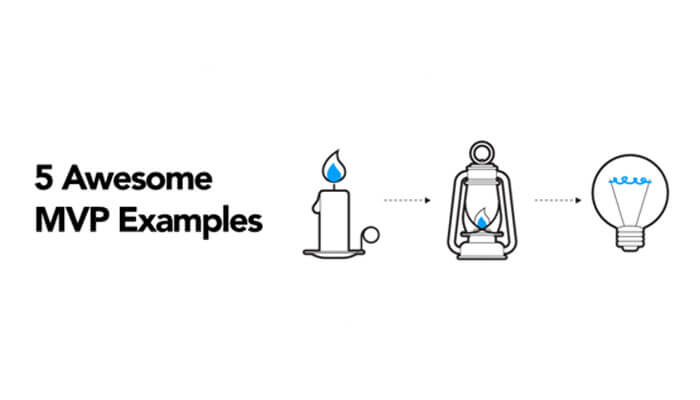In today’s fast-paced world, bringing a new product to market quickly and efficiently is critical for success. This is where the concept of minimum viable product (MVP) comes into play. MVP is a popular methodology used in the tech industry to validate a product idea with minimal resources and time. By creating an MVP, developers can launch a product with just enough features to attract early adopters and gather feedback. In this article, we will explore the concept and essence of MVP, the developer’s goal when creating an MVP product, how to create an original MVP, what should be considered while creating an MVP, and showcase some popular MVP examples.
Additionally, we will provide tips on how to create a successful MVP and how much it costs to build an MVP. So, whether you are an entrepreneur, product manager, or developer, this guide will help you master the art of MVP and create a successful minimum-viable product.
What is MVP?
So, what is the concept and essence of MVP? In essence, an MVP has just enough functionality to draw initial consumers and prove the concept while minimizing the time and cost required for development. The MVP methodology is a popular approach in the tech industry, where rapid prototyping and iterative development are the norm.
When building an MVP product, the developer’s goal is to validate the idea, gather feedback from early adopters, and use that feedback to refine the product. The ultimate aim is to produce something that satisfies customer demands while reducing production time as well as expenses. The MVP approach is a risk-mitigation strategy that allows developers to evaluate their product on the market without spending a lot of money on full-blown development.
How to create an original MVP
Now that we understand the concept and goal of MVP, let’s discuss how to create an original MVP product. The process goes something like this:
1. Identify the problem:
Determine the issue you wish to resolve first. Find the customer pain point and how your product can address it.
2. Define the MVP’s objective:
Define the objective of your MVP. What do you want to achieve with this product? Is it to verify the concept, explore the market, or get early users’ opinions?
3. Come up with a list of essential features:
Once you have defined the MVP objective, develop a list of essential features required to achieve that objective. These features should be minimal and necessary to meet the MVP objective.
4. Build a prototype:
Build a prototype of the MVP to test the essential features. This can be a clickable wireframe, a landing page, or a simple version of the product.
5. Test the MVP:
For valuable input, deploy the MVP to a select number of initial users. That feedback will help you refine the product and add new features.
6. Launc3h the MVP:
Once you have refined the product, launch the MVP in the market. Monitor user behavior, gather feedback, and continue to refine the product.
What should be considered while building an MVP?
There are many things to take into account when building an MVP. These include:
1. Customer pain points: The MVP should address a customer pain point and solve a real problem.
2. Essential features: The MVP should only have essential features necessary to meet the MVP objective.
3. UX: The MVP must deliver a positive experience for users and be easy to use.
4. Scalability: The MVP should be scalable to support future growth.
5. Technical feasibility: The MVP should be technically feasible and possible to build.
Top 5 Popular MVPs and their history
Now that we understand how to create an original MVP product, let’s look at some of the most popular MVPs and their histories.
1. Dropbox:
Dropbox is a program for sharing and storing files on the cloud. The MVP was a short video that showed how the product worked, which went viral and quickly attracted more than 70,000 registrations.
2. Airbnb:
Airbnb is a platform that allows individuals to rent out their homes to travelers. The MVP was a simple website for hosts to showcase their homes and guests to book them.
3. Twitter:
Twitter is a social media website that allows users to post short messages called tweets. The MVP was a simple messaging platform that allowed users to send short messages to a small group of people.
4. Zappos:
Zappos is an online footwear and apparel seller. The MVP was just a website that allowed users to order shoes online and have them delivered to their doorstep. The company founder personally toured shoe shops and took photographs of the shoes, posted them on the website. When an order was placed, he would return to the shop buy the items, and deliver them to the customer himself.
5. Uber:
Uber is a ride-sharing platform that connects riders with drivers. The MVP was just an app that let customers get a taxi and pay for it using their smartphones. The app came out in 2010 in San Francisco and quickly gained popularity.
These popular MVPs demonstrate that simplicity and essential features are key to launching a successful product. By focusing on solving a specific problem and providing a good user experience, these companies were able to launch products that revolutionized their respective industries.
Tips on how to build an MVP
Now that we have discussed the concept and essence of MVP, how to create an original MVP and some popular MVP examples, let’s provide some tips on how to build an MVP and our general conclusion.
Here are some tips to keep in mind when building an MVP:
1. Keep it simple: Focus on essential features and simplicity to minimize development time and cost.
2. Test the market: Launch the MVP in the market and gather feedback from early adopters.
3. Refine the product: Use the feedback to refine the product and add new features.
4. Stay focused: Stay focused on the MVP objective and avoid feature creep.
5. Be agile: Adopt an agile development methodology to iterate quickly and make changes based on feedback.
Conclusion
The MVP methodology is a popular approach in the tech industry, where rapid prototyping and iterative development are the norm. The concept and essence of MVP involve developing a product with just enough features to attract early adopters and validate the idea while minimizing the time and cost required for development. When building an MVP, the developer’s goal is to validate the idea, gather feedback from early adopters, and use that feedback to refine the product. By following the process outlined in this article and keeping in mind the tips provided, you can create a successful MVP and launch a product that meets the needs of the market.



